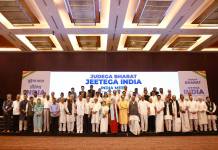Former IPS officer from Gujarat, Sanjiv Bhatt, has sensationally accused an investigative journalist of diluting Prime Minister Narendra Modi’s role in Gujarat genocide of 2002 in her book.
In his Facebook post, titled ‘A little known story from Gujarat,’ Bhatt wrote, “The CBI investigations into Sohrabuddin Shaikh and Tulsiram Prajapati encounters were at their peak. The fates of the then Home Minister and the then Chief Minister (Narendra Modi) were hanging fire.
A young investigative journalist was tasked by her magazine to cover the CBI investigations and look for a story that would sell. She came to Ahmedabad and tried tapping sources in the Police and CBI. Unfortunately for her, information from the State Police or the CBI was not very forthcoming.”
Bhatt went to add that the journalist tried her luck with an Ahmedabad based lawyer activist, who was pursuing the fake encounter cases in court.
“The lawyer activist fell easy prey to the charms of the dusky chain smoking journalist and was more than happy to share juicy case details with her. Stories started taking shape. The journalist wanted more. She got in touch with the duo of IPS officers from the CBI who were leading the investigation.
“The younger of the two IPS officers was attracted to the journalist and she was attracted to him. The inevitable happened. Their meetings increased in frequency. Information started flowing easily. The magazine continued getting good stories. And the young lovers continued having a good time.”
However, according to Bhatt, the journalist and the CBI officer in question were unaware that the guest house where they would allegedly meet was bugged the state government agencies.
He wrote, “But little did the two lovers know at that time that the Government Guesthouses where they used to meet for their amorous peccadilloes were discreetly bugged by the operatives of the State Police. All their shenanigans were captured in lurid colourful detail. The tables turned. The young CBI officer was made aware of the irrefutable video evidence against him. The hunter suddenly became the hunted. Deals were struck.
“The investigation was derailed. The encounter cases were diluted to the point of no repair. The word eventually reached the CBI bosses in Delhi and the IPS officer was removed from the investigation and repatriated to his parent cadre state. But irreparable damage had already been done.”
He continued, “The young journalist was given a choice: face public shaming along with the officer or help in derailing the efforts of the lawyer activist who was heavily besotted with her easy charms. She chose the latter. Things moved as planned. She was used to collect dirt on the lawyer activist.
“The scandalous dirt was smartly used to deter the lawyer activist from pursuing certain sensitive issues before the Commission of Inquiry that was inquiring into the Gujarat Riots of 2002. The lawyer activist eventually withdrew himself completely from the Commission proceedings despite being the only legal representative of the hapless victims.”
In Gujarat genocide, unofficially more than 4,000 people were killed while the official number of those killed stood at 1200, mostly Muslims. Modi was made an accused in the case but an SIT formed by the Supreme Court later exonerated him in the case.
The man RK Raghavan, who headed the SIT, was recently made envoy of Cyprus. Another IPS officer, YC Modi, who was also a part of the SIT, has recently been appointed the chief of NIA, the agency that investigates terrorism cases.
Bhatt wrote, “The young journalist wrote a titillating and fanciful account of her journalistic exploits in Gujarat, but took exceptional care to gloss over the role of the then Chief Minister in engineering the Gujarat Carnage. In return, the book was allowed to be published and publicised without any hindrance whatsoever. What could have been an end-of-the-political-road situation for the political duo from Gujarat, and end-of-the-journalistic-road situation for the young investigative journalist became a win-win situation for both sides.”
He concluded his post with a postscript, “Hope this helps some of you to connect the dots.”
Bhatt, in his affidavit to the Supreme Court in 2011, had accused Modi of being a complicit in the 2002 holocaust. He was later suspended by the Gujarat government before being dismissed from service.
In 2011, Bhatt was accused of helping Modi in derailing Gujarat genocide related PIL by none other than his former boss, RB Shreekumar. While deposing before Nanavati Shah commission of inquiry, Shreekumar had said that the suspended IPS officer played a central role in helping the then Gujarat chief minister Narendra Modi’s bid to derail a PIL by noted danseuse Mallika Sarabhai, apprehending it would tarnish the image of the state government.
Sarabhai, according to an India Today report, had told a packed news conference in Ahmedabad that Modi tried to bribe her lawyer with money from the secret service fund ( SSF) to derail her case before the Supreme Court.
It was Bhatt, who allegedly offered Modi to bribe Sarabhai’s lawyer with Rs 10 lakh on his behalf. The India Today report further added that Bhatt did not reject Shreekumar’s claims, saying he was “a past master of the IB and was assisting the struggling newly-appointed CM (Modi) with the tricks of the trade”.
“I was meeting him on daily basis during that time,” he added.
















